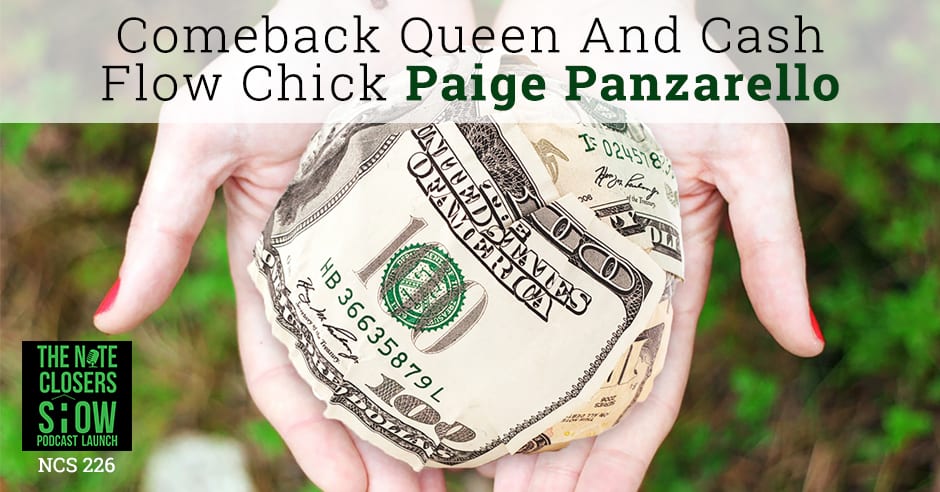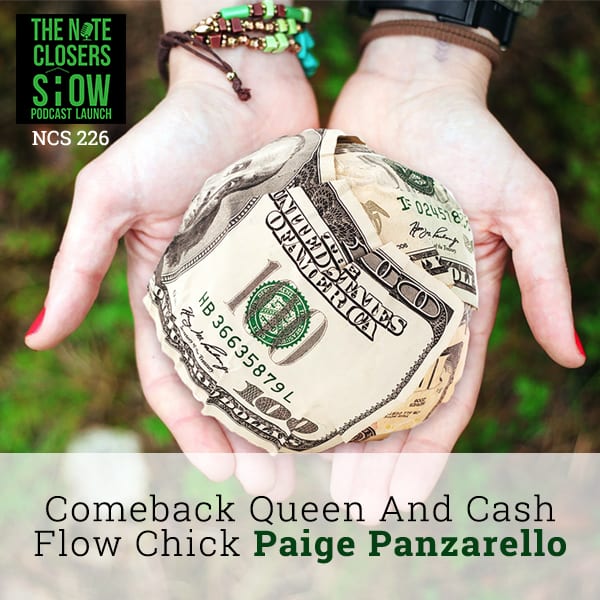
Paige Panzarello used her time wisely when she lost 20 million dollars by surrounding herself with people who could help her get back up. And instead of painting the experience as a failure, Paige saw it as a blessing because it shaped her as an investor who got a solid foundation to move forward. Learn more of how the Cash Flow Chick makes money while she helps people with distressed mortgages stay in their homes.
—
Listen to the podcast here
Comeback Queen And Cash Flow Chick Paige Panzarello
I’m excited to be bringing some amazing guests to the podcast. We have another amazing woman who is out there kicking butt. We’re excited to have Paige Panzarello join us all the way from California.
Thanks so much for having me. I’m really excited to be on the show.
One of the great things that I love about the podcast is good to be talking to people and interviewing people and doing that on a regular basis. A lot of times as note investors, we end up targeting different events, two to three times a year trying to get out to network with everybody. I love the fact that we’ve been able to talk with people like you out there on a regular basis without having to worry about time. It’s something that a lot of us should probably do little bit more so; get on conference calls every once in a while. Won’t you agree to that, Paige?
I absolutely agree. I love that mindset that you have Scott because it’s all about networking and it’s all about community and boosting each other up, and it’s that abundance mindset. I’ve noticed that in you for years. I just wanted to say thank you because I really appreciate that in you. I’m cut from the same cloth.
A lot of us are cut from the same cloth. Obviously, it’s a little bit more friendly than the rest of the real estate side definitely when it comes to notes. For those who don’t know, you’re known as the Cashflow Chick. Why don’t you tell people a little about your history, your background, where you started from and basically diving in into the note game?

Cash Flow Chick: I started by being thrown into the deep end of the swimming pool and not really knowing how to swim by virtue of inheritance.
I’ve actually been a real estate investor for over twenty years. I started by being thrown into the deep end of the swimming pool and not really knowing how to swim by virtue of inheritance. I inherited about 38 townhome units, some land, a sewage treatment plant. I know more about sewage treatment than I ever care to discuss. I very quickly learned that I have to surround myself with people that were in the know. I was a buy and hold. The townhome units we were renting and unfortunately, my grandmother had driven them into the ground. She got on old age and that happens. We had to turn things around. I very quickly realized that I was not a good property manager at all. I have a very big heart and everybody has got a story. I put people in place and along we went. I decided that we needed to sell those properties off because the market rents couldn’t command what we needed to be profitable. We started selling them off and I quickly realized, “I’m selling myself out of a job.” My family was involved in all that and we have this land. I said, “I really, really want to start developing the land.” My family didn’t want to have any part of that. I bought the company. I started to do the groundwork of developing this particular piece of land.
I realized that the contractors were taking advantage of me. I said, “Okay,” and I started my own construction company knowing nothing about construction and I quickly learned. I surrounded myself with people that knew. I brought in the contractor that was the qualifying party and we were rock and rolling. That was in about 2000 and 2001 area. Time went on and things just went crazy. We were building and I had at one point 36 employees. We were building our own projects. We were building other people’s projects. I had lots of assets. I was liquid. I was literally seeing the land having a lot of fun. Then 2007 happened and it all came crashing down. The interesting thing, Scott, is that I saw that it was coming. Silly me being a little bit of novice in that, I didn’t realize that it was going to happen to me because I had so much liquidity. I had a lot of assets. I had things and my relationships with my vendors and my lenders and all of that stuff. It wasn’t me. It was the people that owed me money that couldn’t pay me. I had to fire sale everything. I literally went through in three years of knowing and getting up every morning knowing that I was working toward paying people that I owed, but there is not going to be anything coming back to me. I was okay with that because I was really determined that I was going to pay everybody that I owed. It took me three years. I did it. I did not file for bankruptcy and I was very fortunate that I had those assets that I could sell.
At the end of the day, three years later, I lost $20 million. That’s the lump sum of it. It’s important to point that out. For a long time, I didn’t talk about that. I really don’t look at that as a failure on my part. I really look at that as a blessing. It really shaped me as who I am as an investor. It gave me a strong foundation. I still have investors that invest with me today. Truly when you’re running a construction company, any of you out there that know, it’s seven days a week, 18 hours a day. It was really putting me in an early grave. It was a blessing. I went away clearly from real estate investing for a little while, but I came back. I came back to it because I have two passions. Number one is helping people and number two is real estate, and I get to do both. Coming into the note space, I realized I can do both and that was huge for me. I’ve done a little bit of everything: fix and flip, tax liens, tax deeds, all that stuff but I landed in notes. An angel sang for me and that was it. I’m not leaving. I’m home.
Basically from 2007 to 2010, you’re paying everybody back, getting clear of everything. You’re basically focused on notes almost a 100% now. How did you wake up one day and somebody told you more about notes or you’ve known a little bit about notes? When did you find that focus? Let’s walk through that a little bit. I know a lot of people screw with that who’ve been through down times. They’ve gone through the big D, I don’t mean Dallas, and struggling with buying property and it failed. They’re trying to be a landlord, fix and flipper and they fall flat in their face. It may not be $20 million falling flat in your face but it sure $20,000 or whatever it is.
It is a huge number but it’s all relative. It’s money. There’s one thing in this life that I have learned through all of this. Everything that we have, we can get back except time so use your time wisely. That was a mantra for me as I came back into real estate investing. I did this, most people really come into real estate investing, you’re thinking, “I’m going to fix and flip,” because you need to generate tons of money. You go into wholesaling and you start to do that business and then you start to fix and flip and you realize that that’s very location-specific. As I was going through that process and don’t get me wrong, I love fixing and flipping. I know some tremendous fixer and flippers out there that are amazing at what they do. I love taking the old, ugly house and making it into a beautiful house. I just don’t like the in-between process because I’ve been there and done that.

Cash Flow Chick: I am not dependent on anybody else. I am not location-specific.
I was in my fix and flip projects and I met a gentleman that stood up at an REI meeting. I was there and he said, “I do non-performing notes.” I said to him, “I had been thinking, I heard about this,” and I thought, “What’s that?” This was about four years ago and I said, “That’s interesting.” I went up to him and I said, “I’d really like to volunteer some time. I’m of the real estate mindset so you don’t have to teach me and I got stuff, but I’d really like to help you to grow your business and learn as we go along.” He agreed. He actually became a mentor for me and he realized very quickly that I pick things up very quickly. I was very lucky to have that mindset and that focus and the background frankly. Education in real estate is hugely important no matter what space you’re in. It’s hugely important. If you don’t have that, you’re going to get hurt. I started studying under him. I was finishing all the last couple of fix and flips and I had massive problems with the contractor and inspectors and all that stuff. As I’m studying I’m thinking, “There’s something really to this. There’s something to this.” The reason why is because I am not dependent on anybody else. I am not location-specific. I could be anywhere in the world and do this business as long as I have a phone and an internet connection. That’s it. I control the outcome. You can imagine after 2007 how important that became for me, that I control the outcome. I can generate tons of cash. I can generate streams of cash. I can joint venture. I can do my own portfolio and we do all of that stuff. For me, that’s why an angel sang. It really boils down to, “I’m in control of my own destiny, my own money and the best part is I get to help people try and stay in their home and make money doing it.” It tied everything together for me. That’s how I came into this space.
Are you talking about Joseph as your partner?
Yes.
Joseph Hobbs is a great guy. He is a mastermind member of ours in the past. He’s got a big heart too for helping out. You make a really good partnership when it comes to that aspect of things. You’ve been buying notes from Joseph and how did the Cashflow Chick?
I wanted to incorporate one of my passions and that is helping people. Not just people in distress that have distressed mortgages, but people that are trying to break into real estate investing or trying to break into note investing, and to help them to educate and take care of their own financial future. Scott, you and I know that 401(k)s and all the rest of that stuff, your retirement plan, it’s not going to be enough when you retire. It just isn’t. People I think are realizing that but they don’t know where to go. Joseph and I sat down and we had a conversation. We do teach a workshop and we have for a couple of years now. We decided, “Let’s be able to grow a little bit bigger.” We’re scaling. We were able through Cashflow Chick, to reach out to people, to connect with people and that’s what it’s really all about. Any business but especially our business is all about people and it’s about networking and relationships. That’s how Cashflow Chick was born.
Let’s talk about your basic business model. What’s your bread and butter for your note business?
We focus on first position. There are very successful second position lien holders out there and note investors and that’s tremendous. For me, I just prefer the first position. Having been through 2007, you really need to focus on who you are as an investor to create the path that’s going to take you there. For me, first position was always a no-brainer. With first position, we focus on non-performing notes. The reason that we do that like you, Scott, we buy at a discount. We create a cushion of equity from current market value, not ARV, not any of that. It’s buying current market value and create that cushion. If there is a market fluctuation, if we buy our notes properly, we’re not really going to be affected. It’s not going to be a huge smack to the side of our head unlike some of the other forms of investment out there, first position non-performing. We also focus on across the country. There are states that we don’t buy in strictly because the foreclosure times are not conducive to our model. We generally like to be able to exit notes twelve months or less. Sometimes that works and sometimes it doesn’t but for the most part, it does. Then median value, anywhere from $50,000 up to about $200,000, $225,000 to $250,000 is our sweet spot and where we focus. We do go a little lower and we do go a little higher. That’s our niche and we love it.
That’s a great niche to be because it’s really your first-time homebuyers, that’s your biggest pool of buyers. Depending on the city it’s in, $225,000 would be a high-end if it’s in Cleveland but low-end if it’s in other areas too. That’s where we see 90% of the distressed assets out there in that price range for the most part. What advice would you give anybody who’s been through rough times or is going through rough times and looking for a way out? Not everybody can recover from a $20 million loss. What advice would you give people that are struggling with their goals?
I actually, believe it or not, don’t get that question often. My advice is this. Number one, it’s mindset. It’s just a thing. I hate to say it that way and I don’t mean to be a cavalier in any way, shape or form, it’s just a thing. Remember, the only thing that you can’t get back is time. Dust your sofa, surround yourself with people that will prop you up. There are plenty of them that are out there. Join groups, go to Meetup, talk to masterminds, participate in webinars like this. Start building your network because believe it or not, everybody that’s out there, I guarantee you, something bad has happened to them at some point in their life and that gives you a way to bond. Talk to them about that.
For a long time, I sat silently crying inside thinking, “I failed. I failed.” I didn’t fail. It was a hard-learning lesson. It brought me back stronger than ever. Reach out to your network. Reach out and if you don’t have family and friends that are in your network, create another one. Go somewhere else. Go into a REIA group. Go into a class that’s some interest for you and develop your support system that way because that is going to be your foundation. Those are the legs that you stand on. That’s how you start to come back. I know Scott has always said, “Participate,” so do that. Same thing with me, do that. Reach out and participate. Educate yourself because you don’t want to go through it again. Don’t make the same mistakes. Leverage people like Scott and like me and our scraped knees because we’ve been there. Leverage us. Educate yourself and then move forward. You’ve got to move forward because you can take all that other stuff and if you don’t put action behind all of the stuff that you’re doing, you’re going nowhere. Be bold and step forward and you can.
The only reason we are at where we are today is because we have failed more times than most people.
My favorite phrase, “Ask me how I know.”
We have a question, “Are you getting most of your tapes directly from banks and so how much time are you spending marketing to them?”
Like anything, it’s always sourcing a deal and money. Those are the two biggest things in any kind of investing especially real estate investing. The answer is yes and yes. Yes, we do get direct from banks. We also buy from hedge funds. We also buy from brokers. We buy from other note investors. We buy from everywhere that has a note and has got it. We market to them. We let them know we’re here. We develop relationships with them and then we do what we say we’re going to do. That’s hugely important in this space. Scott, you are the master attesting to this. If you have a vendor that you’re buying from, you absolutely have to perform. Otherwise, it’s a little black mark and believe me when I say, everybody knows everybody in this space. We do market. We do develop the relationships. We go to the events. We send emails, we make phone calls, all those things and network.

Cash Flow Chick: If you have a vendor that you’re buying from, you absolutely have to perform. Otherwise, it’s a little black mark and believe me when I say, everybody knows everybody in this space.
How much of your time is spent on marketing for new assets or new tapes?
A good portion of it. Between the network and the product, that’s the foundation of your business. We generally spend anywhere between 75% and 80% of our focus with marketing and networking with people that can provide products for us.
We have a question, “How do you fund your notes or raise capital to fund your note deals?”
A couple of different ways. I had to start out. I didn’t have a whole lot to start out and my last couple fix and flips were not as productive and profitable as we had hoped. We do a couple of different things. There are people that are out there in your network that you know that you can talk to and bring into the scenario. Take a loan from them. More often than not, people have retirement funds that are sitting there that are earning maybe 2%, 3%, 4%, sometimes a little bit higher, but could you do better? Is it a little bit safer than perhaps being in the stock market? Only they can answer those questions but absolutely, don’t be afraid to tell people what you’re doing. That’s the biggest thing. Understand, you’re not selling anything. You’re giving them an opportunity to participate in something that can be potentially very lucrative and help people while along the way. Definitely talk to other people. We do joint venture. We have our own capital now that I’ve been in the space long enough and we built up our own capital. At some point, our own capital runs out. We have to tap other sources. Unless you have hundreds of millions of dollars which I don’t yet, bring people along with you because that’s important. It’s really important to help people along in their journey. Believe it or not, as long as you don’t try and sell because you don’t have anything to sell, you’re giving them an opportunity. That’s what we use to fund our note products.
A lot of people are nervous about going out. Do you raise capital then go find deals or do you go find deals and then raise capital?
Yes and yes. I do it simultaneously. For those that are new, I suggest this. Joint venture with somebody who’s already in the space, leverage their talent. Really talk to them about, “We’re joint venture partners. I know that you’re going to be raising capital. Can I sit in on that phone call and listen to what that sounds like?” If they say no, in my opinion you probably shouldn’t be in a joint venture position with them because there’s not a lot of trust there. Unless there are certain confidentialities that you need to protect and that is understandable. Sit with them and talk with them and find out what they say, “Leverage us and our talents.” Then go out and do it on your own. In my opinion, you should not try this the first note or the first couple of notes frankly on your own. Have somebody that’s in the space that already knows and then do what they do. Follow them. Act with them. Connect and participate with them and you’ll be on your way.
We have a question, “Would you pull from any of your fix and flip contacts about funding notes and how did those conversations go? Were they weary? For the fix and flipper, were they comfortable because it was a deal?”
The answer is yes. I have a very large nationwide network of people that are fix and flippers. Join those groups. Go to their pockets. Start to connect with fix and flippers across the country. The two biggest things that people look for are deals and money. Sometimes fix and flippers have money and also have private money that they’re paying on that need to be placed into a deal. When you bring up notes especially to a seasoned fix and flipper who is having trouble finding their next deal or has private money that needs placement, believe me when I tell you, as long as you understand what you’re doing or you can leverage a team that understands what they are doing, then you will have success in bringing those fix and flippers on board absolutely.
Knowing your strategies and being able to explain that because fix and flippers a lot of times are not struggling because they have money that they’re losing because they don’t have a place with the deal for the most part. That’s the one thing you’ve got to be able to talk about and say, “You want to do a deal but you can’t find it, then let me put the money to work and still come out smelling even better than you would on the fix and flipside.” We have a question, “Do you only use accredited investors?”
No. Because we have scaled and because we have grown, we are actually in the process of setting up a fund to include people that might not have a huge amount of money but have some money and want to participate. We’re doing work with accredited investors both and non-accredited investors.
One of the great things I think, and I don’t know the answer to this so I’m going to say, “I think,” but you and Joseph have a little bit different personalities. Joseph is a little bit more reserved, a little bit quieter, the quiet confidence aspect of things. How do you divvy up what goes in the line? A lot of people struggle, “Do I need to get a business partner or can I do it with VAs?” How does that dynamics work in your partnership?
It really does work very well between Joseph and myself. I am definitely more outgoing. I have an energy level that fills the room and Joseph is very humble and very quiet. Probably one of the most brilliant men I’ve ever met in my life. I want to point something out. Joseph is older than I am and when I came into this space, it lent some credibility because I thought, “Here’s a gentleman who can’t risk losing any money because he is not going to have the time to bring it back up.” I started listening to this quiet, humble man and realize he is just absolutely brilliant. How we divvy things up? Generally, I do most of the marketing of Cashflow Chick. Even though he’s part of Cashflow Chick, I’m Cashflow Chick. We both go to the shows together and network together. We both go to REIA meetings together or sometimes separately, but we both do that and we teach the class together.

Cash Flow Chick: Cashflow Chick – Growing Your Nest Egg
In terms of tape evaluation, all the rest of that stuff, tapes generally will come through me first. I will do the initial sweep and then once we have accepted offers from our sellers, I send it to the rest of the team, which Joseph heads. They scour the collateral file, all the rest of that stuff and then when they come back with a yes, then we fund the deal. We both manage together. We have team members that that are managing our other team members, loss mitigation, servicing, etc. It’s a nice divvy and we’re growing. We’re bringing in more team members as we grow.
Joseph actually taught a few years back, meeting with local people there like you talked about how you met him there, going through the due diligence and the breakdown of stuff, little meetings and stuff like that and has grown it from the local there. Where’s home for you?
We’re in California in Ventura County, north of Los Angeles County. One thing about Joseph, I was absolutely floored when we started because due diligence can be very daunting especially if you have even just initial evaluation. Even if you have a tape that’s 200 assets, how do you pick and how do you start and all that stuff? You need to really know those things. He taught all of that. He also said, “There’s got to be a better way.” He doesn’t give himself enough credit. I’m going to take this opportunity, Scott. We all as note investors have our own preset criteria. There are certain things that we look for population, beds, baths, etc. He said, “There’s got to be a way to take a tape and just do a sweep, initial evaluation and skim off the ones that we don’t want o spend our time on. What’s our most valuable asset? It’s our time. He actually developed a software. We are the only ones that have it. He developed a software to take a tape, we input a tape, and based on preset criteria, it actually spits out to us what we should look at and do further due diligence. It gives us a little bit of an advantage that we can quickly go through a tape and be able to skim off the top, “No, this is not something that fits our criteria and we don’t waste our time.” He developed it. It took him over 500 hours to do but he developed it, and I’m just so proud of him and I had to give him a shout-out on that one.
His ROI calculator is definitely a scrubbing tool for you and stuff like that. I have seen it. You sit with me. We bounced some ideas off when we were going through it. He’s done a great job with it which is great. We’ve got a question, “What would you say is your most challenging thing on the note business right now?”
We always want more product, always, always, always. Scaling, as you scale and grow, you’re going to scrape your knees a little bit. Scaling, we’ve been very blessed that we have some great team members just growing and scaling and being able to manage the managers. As we all know and Scott, I’ve heard you talk about this over and over again, there are lots of servicing companies that are out there. A lot of them are the lesser of two evils scenario. It’s just a matter of making sure to put your systems in place and be able to scale as fast as you are growing. We have had a couple of challenges but we’re right on track and we anticipated that. We’re excited with our growth and where we’re going.
What are your 2018 goals?
Joseph and I have different goals. Even though we’re partners, we’re different investors. I set a goal that at the end of three years, I want to have 1,000 notes in our own portfolio. That’s a pretty lofty goal. We’re still working on that. Be able to scale, help people, to bring them into the family of the note investing business and those that do take the workshop and take classes and realize. I love seeing that light bulb go on. That’s part of it is to increase the number of our family, provide opportunity for more homeowners that are in distress and also for more investors that are in distress as well.
What’s Joseph goals compared to yours?
He’s getting to a place where he wants to have just nothing but passive income. His goal is about $30,000 in passive income per month, and I definitely would love to have that as well. I have a little more time and I want to create that legacy build for the family and the rest of it as we go along.
You know each other’s goals. They work very well together to do that. It’s a great win-win. It can be different, but it works well together and that’s a great partnership. We’ve got another question, “Given that the Hardest Hit Funds have expired in some states, do you still buy notes in those areas?”
Yes. Hardest Hit Fund as far as I’m concerned, that was always the cherry on top of a sundae. I didn’t ever evaluate a deal only by because it’s in the Hardest Hit Fund. If we get to have some funds come back to us through HHF, great but it’s not a deal-breaker for me in one way or another. It’s actually very ancillary and off to the side.
There are some people out there that are just buying with that being their main exit strategy, which I think is a very, very big mistake. They go, “We’ll get Hardest Hit Funds.” That’s not the case.
As long as you do your due diligence and you buy your note well, you’re making money on the buy. You collect your money when you sell or in our case, exit. I think if you are just focusing on the HHF states, you’re really going to be missing a lot of opportunity that’s out there across the rest of the country.

Cash Flow Chick: As long as you do your due diligence and you buy your note well, you’re making money on the buy.
There are some states to avoid, New York, New Jersey primarily because of the longer and the difficult foreclosure process in those areas. Nothing against our friends up in the New York and New Jersey areas. The thing to keep in mind too is the Hardest Hit Funds are great, but there’s a lot of other good inventory in the neck of the woods there. Obviously, cashflow is a big thing. I’m willing to bet you’re probably focused on owner-occupied or occupied assets that you can obviously get re-performing faster. Probably not as many vacant properties as beforehand because you don’t want to do the fix and flips for the most part.
We do both, Scott. We need to know so we know but because of the network that we have across the country, I know plenty of fix and flippers that I can take that note if it is vacant and we turn it. If it does come back as REO through foreclosure or deed in lieu or whatever, I can flip it to them and sell it to them and carry the paper for them too. Neither Joseph nor myself really mind vacant versus owner-occupied. It’s just another data point that we need to know about so we can direct our exit strategy.
Being able to find the most effective one that works for you. First quarter of 2018, what are going to be some of the highlights, what are some of things that you’ve got set for yourself personally in the next 90 days? 1,000 deals in three years is great. That’s almost a note a day, I love that. Have you got any quarterly, sixth-month goals that you’re working towards?
I do actually. A lot of life development. When I was building my business and I talked about owning a construction company and working eighteen hours a day, seven days a week, when you’re in the development and growing and scaling, you dedicate a lot of time to your business and make sure especially when you have other people’s money. When you’re talking and JV-ing with investors, you take that very seriously. For us, we protect that better than we protect our own money. It’s that important. Goals for the first quarter and actually throughout all of 2018 are really to bring on more team members, recapture some of my personal time, the workouts, that’s a personal goal of mine. How to do that first thing in the morning? We’re going to implement that whole strategy. Focusing and capturing the time and educating myself too because I love to learn. I don’t know everything. I’m actually listening and starting some developments and taking some time for myself to learn and educate myself in other things and grow not only emotionally, mentally, physically as our business is growing too. That work-life balance is really important. That’s a big especially first quarter goal for me and my husband and my business partner. We’ve set all those goals. That’s important.
You are teaching classes on a regular basis, you want to talk a little bit about that?
We do teach a workshop called Building Wealth With Notes and we will do it three times a year. We originally started doing it. They are live. We do keep it small and we do that for a reason. We want to be able to network with the attendees. We want the attendees to be able to network with each other. We want to get to know you. We want you to get to know us. There are a couple of different reasons that people attend. Number one, they want to learn about the note space. They want to know how to do it and we give them all the tools including our team members and our contacts so that if they really wanted to do this on their own or joint venture together, they could. The other aspect of it is our capital salary at certain point. Those people who say, “I love this but I’m a little unsure and I want to joint venture with you.” Granted, we don’t take everybody. We are very selective because when you start dealing with people and emotions and money, it’s very much like a marriage. We date our funding partners. We don’t just automatically get married and it’s important.
We do teach our workshops three times a year. We are actually expanding this year. There’s been a call for the last year and a half for us to come to the East Coast. We are going to be in Tampa, Florida and then we’re coming back to California and the other two will be in California. We think one in Orange County and one here in Ventura County. It’s three days and it’s hands-on. You learn and we teach you hands-on experience as well. It’s a great event. Everybody loves it and we do too. I love seeing that light bulb go on for people and it usually happens a couple of times throughout the workshop. BuildingWealthWithNotes.com if you want more information or CashflowChick.com.
What would you say is your biggest issue with the note business? What’s the biggest problem that you deal with on a regular basis?
Servicing, not loss mitigation. Our loss mitigations team is absolutely stellar. We do a have a good servicer. We did scrape our knees quite a bit at first. We had a servicer that caused some trouble. It’s just a matter of scaling and managing your managers and knowing what you’re doing. You have to educate yourself. You cannot just jump into this business. You have to educate yourself in some way, shape or form. That’s probably on a daily basis. We have ongoing note files that are constantly turning. If I’m going to get to my 1,000-note goal by three years, having that scale and the managers and the team in place is going to be hugely important. We are continuing to develop and grow and get better and succeed in that.
Paige, thank you so much for joining us here in The Note Closers Show. I appreciate a lot of your straightforward just telling like it is aspect. It may not be always pretty, but it sure is always interesting.

Cash Flow Chick: Don’t lie to people. Don’t lie to anybody. Just tell it like it is and be you and you will be successful.
I love that about you too, Scott. You say it like it is. There’s no fluff. That’s why we’re birds of a feather because it is how it is and we don’t need to sugarcoat it. I think that’s important. That’s why we’re successful. Keep doing that too. Don’t lie to people. Don’t lie to anybody. Just tell it like it is and be you and you will be successful.
Paige, you will be joining us. You’ll be speaking at Note Camp 5.0 in April as well too. We’re excited about that.
Thank you so much for inviting me to participate. I’m really looking forward to it and I’m looking forward to interacting with the attendees as well.
We look forward to seeing you around the note world, Paige.
Thanks, Scott. I appreciate it.
Go out and make something happen. As Paige said and as I’ve said, don’t let your failure stop you or your previous failures stop you from going out and achieving the type of success you’re looking for. It’s important. We all are going to make mistakes. Things are always going to happen to us. It’s not the size of the dog in the fight, it’s the size of the fight in the dog. Keep fighting forward. Keep failing forward if you have to because you’ll learn more from your failures than you ever will from your successes. That’s the only way that you’ll make it to the top is by keep putting one step forward, keep going, doing it again and again. Making more and more offers and going from there. Have a great day. We’ll see you all at the top. Thanks, Paige.
Thanks.

